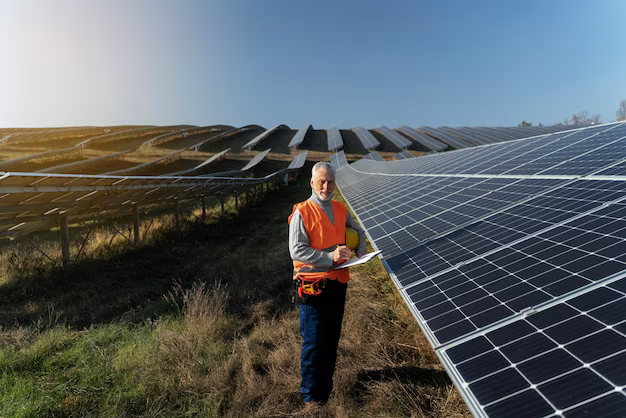Florida’s Ultimate Guide to Launching a Solar Business
Florida, fondly called the ‘Sunshine State,’ isn’t just a haven for beach lovers; it’s a goldmine for solar enthusiasts! With over 230 days of sunshine annually, it’s no wonder the solar industry is booming here. So, if you’ve been toying with the idea of setting up a solar company, there’s probably no better place. But where to start?
Understanding the Florida Solar Landscape
Florida ranks in the top tier of states harnessing solar energy. With its pro-renewable energy policies, massive consumer base, and ample sunlight, it’s the place to be. But before diving in, understanding the state’s solar landscape is crucial.
- Current Solar Installation Rate: As of last year, Florida installed approximately 5000 megawatts of solar power;
- State Solar Policies: Florida’s net metering policy and various tax incentives make it lucrative for new entrants;
- Consumer Adoption Rate: A steady 10% year-over-year increase in household solar installations. Imagine tapping into that!
Legal Framework and Setting Up Shop
Navigating the bureaucratic maze can be daunting. But fear not, we’ve got your back.
Business Registration
First things first, get your business registered in Florida. The Department of State Division of Corporations is your go-to place.
Permits and Licensing
Solar installation requires specific permits. The Department of Business & Professional Regulation is your destination.
Understand State Specific Requirements
Florida has unique requirements like wind load calculations due to hurricanes. Ensure your installations meet these standards.
Funding Your Solar Dream
Cash might be king, but funding is the emperor when starting a business. Florida offers a range of funding options:
- Grants and Incentives: Dive deep into the federal and state grants available for renewable energy projects;
- Venture Capital: Several venture capitalists specialize in green energy startups;
- Crowdfunding: Platforms like Kickstarter or GoFundMe are now increasingly popular to fund eco-friendly projects.
Training and Skill Development
Solar isn’t just about placing panels. Proper installation, maintenance, and customer education are paramount.
Certification
Consider getting certified by the North American Board of Certified Energy Practitioners (NABCEP). It’ll give you a leg up!
Workshops
Periodic training workshops will keep your team updated on the latest in solar tech.

Finding Your Unique Selling Proposition (USP)
The market’s buzzing with solar companies. How will you stand out? Maybe you’re the budget-friendly choice, or perhaps you focus on high-tech solutions. Pinpoint that USP!
Building Client Relationships
Trust us, it’s not just about the tech.
- Networking Events: Attend, sponsor, or host. Get your name out there!;
- Referral Programs: Let your satisfied customers be your brand ambassadors;
- Community Outreach: Consider offering free solar workshops or school demos.
Scaling Your Operations
Once you’ve laid the foundation, think expansion. Diversify into related sectors like solar water heaters or battery storage. Partner with construction firms or realtors for exclusive deals. The sky’s the limit!
Facing Challenges Head-On
Every business has its rainy days. In the solar sector, challenges might include:
- Technical Challenges: Ever-evolving tech can be hard to keep up with;
- Regulatory Hurdles: Policy changes can throw a wrench in the works;
- Competition: The increasing number of players can make standing out tough.
Harnessing the Best Solar Technology
In the solar arena, technology is constantly advancing. Picking the right tech can make a significant difference in efficiency and customer satisfaction.
- Monocrystalline vs. Polycrystalline Panels: The former offers higher efficiency but at a steeper price, while the latter is more budget-friendly but slightly less efficient. What suits your business model?;
- Solar Trackers: These devices adjust the angle of panels throughout the day to maximize sunlight absorption. A little pricier, but they can boost efficiency by up to 25%;
- Battery Storage Systems: With the decreasing costs of solar batteries, offering storage solutions can be a game-changer, allowing clients to store excess energy for nighttime or cloudy days.
Solar Panel Efficiency Comparison
| Panel Type | Efficiency | Average Cost per Watt |
|---|---|---|
| Monocrystalline | 15-20% | $1-$1.50 |
| Polycrystalline | 13-16% | $0.80-$1.10 |
Marketing Your Solar Venture in Florida
The Florida crowd is eco-conscious but reaching them effectively requires strategy.
Digital Marketing
Utilizing SEO and SEM can place your brand in front of those actively searching for solar solutions in Florida.
Social Media Campaigns
Share success stories, time-lapse installation videos, or customer testimonials. Platforms like Instagram and Facebook are great for visual content.
Local Sponsorships
Consider sponsoring local events or sports teams. It not only builds brand awareness but solidifies community relations.
Maintenance and After-sales Services
Once panels are up, the job isn’t over. Offering stellar after-sales services can ensure customer loyalty and generate word-of-mouth marketing.
- Regular Check-ups: Offer bi-annual or annual maintenance checks. It assures clients their panels are in top shape and fosters trust;
- Warranty and Repairs: Ensure that your company provides robust warranties and rapid repair services. It’s not just a selling point but a necessity in the solar business;
- Customer Support: A dedicated helpline or chat service for queries or complaints can make a world of difference in customer satisfaction.

Environmental and Community Impact
Beyond business, there’s a bigger picture – the planet. Emphasizing the environmental impact can resonate deeply with the Florida populace.
Carbon Offset
Every megawatt of solar power reduces carbon dioxide emissions by over 1,000 tons over its lifetime. Highlighting this can appeal to eco-conscious clients.
Community Solar Farms
Consider projects where communities can invest in shared solar farms. It’s a win-win, giving access to solar for those who might not have suitable rooftops.
Educational Initiatives
Host workshops in schools or community centers about solar energy’s benefits. It not only markets your brand but educates the younger generation.
The Rise of Solar-Adjacent Opportunities
Florida’s solar boom isn’t just about panels and installations. As the industry grows, a myriad of related opportunities spring forth, creating a holistic ecosystem. Entrepreneurs can tap into these avenues to diversify and bolster their offerings.
Integration with Smart Homes
The modern Floridian home is evolving into a smart hub, integrating various technological solutions for enhanced living. Integrating solar solutions with smart home systems can be a lucrative proposition. For instance, smart meters can help homeowners understand their energy consumption patterns, allowing them to make informed decisions about their solar energy use. Collaborating with smart home tech providers or offering integration services can amplify the appeal of a solar venture.
Solar-Powered Transportation
With electric vehicles (EVs) gaining traction, the demand for EV charging stations is set to skyrocket. Solar companies in Florida can leverage this by offering solar-powered EV charging stations. These setups not only reduce the carbon footprint further but create a synergy between two green tech revolutions. Moreover, residential solar installations can be bundled with home EV charging solutions, presenting a comprehensive green package for homeowners.
Recycling and Sustainability
As the solar industry matures, there’s a growing need to address the lifecycle of solar panels. Once they reach the end of their functional life, they shouldn’t just be discarded. Establishing a solar panel recycling division can be a forward-thinking move. It not only addresses environmental concerns but positions a company as a sustainability leader. The process involves extracting valuable materials like silver and silicon, which can be reused, ensuring minimal waste and promoting a circular economy.

Collaborations and Partnerships
In the vast solar expanse, collaboration can be the key to unlocking untapped potential. By forging strategic partnerships, companies can benefit from shared expertise, resources, and market reach.
Joining Forces with Real Estate
Real estate developers are constantly seeking ways to enhance the appeal of their properties. Solar installations can be a significant selling point for modern homes. By collaborating with developers, solar companies can ensure that new properties come pre-equipped with solar solutions, providing a seamless experience for homeowners and continuous business opportunities.
Utility Company Tie-ups
Utility companies in Florida have recognized the solar surge. Some are even offering rebates and incentives for solar installations. By establishing partnerships with these utilities, solar companies can offer streamlined services such as grid integration, net metering setups, and easier access to incentives for customers.
Research and Development Collaborations
Solar technology is constantly evolving. To stay at the forefront, companies can benefit from partnering with research institutions or tech startups. Such collaborations can facilitate access to the latest advancements, from high-efficiency panels to breakthrough storage solutions. This not only enhances service offerings but cements a company’s position as an industry innovator.
Consumer Education and Outreach
Beyond installations and technicalities, there’s a profound need for consumer education in the solar realm. The average homeowner might be unaware of the intricacies and benefits of solar energy.
Workshops and Seminars
Hosting regular workshops can be an effective way to demystify solar technology. By breaking down concepts into easy-to-understand segments, potential consumers can be better informed about their choices. Whether it’s the science behind photovoltaic cells or the long-term cost savings, such platforms offer an opportunity for direct engagement and query resolution.
Digital Content and Resources
In today’s digital age, an online presence isn’t just about marketing. Solar companies can create dedicated sections on their websites offering articles, videos, and infographics explaining solar concepts. Such resources can be invaluable for homeowners researching solar options, helping them make informed decisions and positioning the company as a trusted knowledge source.
Community Initiatives
Engaging at the community level can be instrumental in fostering trust. Solar companies can sponsor local green initiatives, participate in community fairs, or even partner with schools for educational programs. Such grassroots-level engagement not only spreads awareness but solidifies a brand’s reputation as a community-conscious entity.
Navigating Florida’s Regulatory Landscape
Every state, including Florida, has its specific set of regulations and guidelines when it comes to the solar industry. Being well-versed in these can mean the difference between smooth sailing and potential roadblocks for your solar company.
- Interconnection Standards: Florida has laid out specific standards for connecting your solar installations to the grid. It’s essential to be aware of these to ensure your systems are compliant and can seamlessly feed into the local power grid;
- Net Metering Policies: This is a system where solar energy producers can get credit for the excess energy they contribute to the grid. Florida’s net metering policy can be advantageous for homeowners and businesses, which is a significant selling point for potential clients;
- Building and Zoning Codes: Each locality within Florida might have its specific codes that affect solar panel installations. Ensuring that every project adheres to these can save you time and legal hassles.
Key Regulatory Bodies in Florida
| Regulatory Body | Purpose |
|---|---|
| Florida PSC | Oversee state utilities and net metering |
| Florida DEP | Environmental protections and impact assessments |
| Local Municipalities | Building codes, zoning laws, and local solar incentives |

Cost Analysis and Financing Options
The initial cost of setting up solar panels can sometimes be a deterrent for potential clients. But with the right financial models and a clear breakdown of costs, this hurdle can be effectively addressed.
- Initial Investment Breakdown: When pitching to potential clients, offering a clear and transparent cost breakdown – from equipment, labor, installation, permits, to maintenance – can establish trust and eliminate guesswork;
- Return on Investment (ROI) Calculations: Demonstrating the potential savings over time, compared to traditional energy sources, can help clients visualize the long-term benefits. Highlighting the rising costs of traditional energy can also emphasize solar’s cost-effectiveness;
- Financing Models: Offering various financing options, from solar leases, power purchase agreements (PPAs), to straightforward financing plans, can cater to a broader client base with varying financial capacities.
Client Engagement and Feedback
To ensure the sustainable growth of your solar company, continuous engagement with existing clients and adapting based on feedback is paramount.
- Regular Updates: Keeping your clients informed about advancements in solar technology, upgrades, and potential add-ons can foster brand loyalty and drive repeat business;
- Feedback Mechanisms: Implement digital surveys or feedback forms post-installation. Direct feedback can offer invaluable insights into areas of improvement, potential product/service additions, and overall client satisfaction;
- Referral Programs: Encourage your satisfied clients to refer friends or family. Offering incentives for successful referrals can not only expand your clientele but cement the trust with your existing client base.
Scaling and Expanding Your Solar Business
Once you’ve firmly planted your roots in the Florida solar market, the next logical step is scaling and potential expansion. Diversification and strategic growth can amplify profits and market presence.
- Diversifying Product Offerings: Venturing into related products like solar water heaters, solar pool pumps, or even solar-powered garden accessories can cater to a broader audience and drive additional revenue streams;
- Geographical Expansion: Considering branching out to neighboring states can be a lucrative move. However, this would involve understanding the regulatory landscape, market dynamics, and potential competitors in the new territory;
- Training and Workshops: Offering training sessions or certification programs for budding solar technicians can not only generate revenue but position your brand as an industry leader and knowledge hub.

Branding and Marketing Your Solar Business
In a growing industry such as solar, creating a strong brand identity and effectively marketing your services becomes paramount to stand out amidst the competition.
Unique Selling Proposition (USP):
Determine what sets your solar business apart. Whether it’s your advanced technology, customer service excellence, or flexible financing options, highlighting your USP will make your brand memorable.
Digital Presence:
Ensure you have a responsive website that’s optimized for search engines. Regularly update your site with relevant content, client testimonials, and case studies showcasing successful installations.
Local Engagement:
Sponsor local community events, participate in green initiatives, or host informational seminars. Such local touchpoints increase brand visibility and establish your business as a community ally.
Effective Marketing Channels for Solar Businesses
| Marketing Channel | Description |
|---|---|
| SEO & SEM | Drive organic and paid traffic to your website. |
| Social Media | Engage potential clients with visual content & stories. |
| Email Marketing | Share updates, offers, and news with subscribers. |
| Local Newspapers | Capture the local audience’s attention. |
Challenges and Mitigation Strategies
Every business venture comes with its set of challenges. For solar entrepreneurs in Florida, understanding these potential pitfalls and preparing in advance can be the key to resilience.
Regulatory Changes
The solar industry, being environmentally centric, may face evolving regulations. Keeping abreast of these changes and being flexible in your business strategies can help navigate these shifts.
Technological Evolution
Solar technology is ever-evolving. Constantly updating your offerings and ensuring your team is trained in the latest installation and maintenance practices is vital.
Competitive Market
As the industry grows, so does the competition. Regular market analysis, understanding your competitors, and adapting based on client feedback can give you the edge.
Innovations and Future Trends
The future of solar energy is not just restricted to panels on rooftops. Many innovations are on the horizon, and staying updated can position your company as a forward-thinking leader.
- Bifacial Solar Panels: These panels can capture sunlight from both sides, increasing efficiency and energy output. Incorporating such advancements can be a significant selling point;
- Solar Storage Solutions: As battery technology advances, the ability to store excess solar energy efficiently will become more accessible. Offering integrated storage solutions can add value to your installations;
- Solar Skins: Personalized aesthetic solutions for solar panels, like solar skins, allow panels to blend seamlessly with rooftops, addressing aesthetic concerns some homeowners might have.
Cultivating a Company Culture
The success of any business often lies in the hands of its employees. Creating a positive, inclusive, and growth-oriented company culture can drive team motivation, reduce turnover, and improve client relations.
- Continuous Training: Ensure your team is updated on the latest solar trends, installation techniques, and customer service best practices;
- Open Communication: Foster an environment where feedback is encouraged, and every team member feels heard and valued;
- Health and Safety: Given the nature of solar installations, prioritize the health and safety of your employees. Regular safety drills, updated equipment, and comprehensive insurance can instill confidence in your team.

Wrapping it up: Bright Days Ahead
Starting a solar company in Florida is not just a business decision; it’s a contribution to a sustainable future. The journey might have its share of cloudy days, but with the right approach, the sun will always shine bright on your venture.
FAQs
While it varies, a ballpark figure would be $50,000-$100,000, inclusive of licensing, equipment, and initial marketing efforts.
Yes, especially considering Florida’s weather conditions. Comprehensive liability insurance is highly recommended.
Given the growing market, a well-strategized solar company can expect to break even within 1-2 years.
It’s a nationally recognized certification that lends credibility to your services and assures clients of your expertise.
Absolutely! Florida’s net metering policy allows solar companies to sell excess energy back to the grid.








